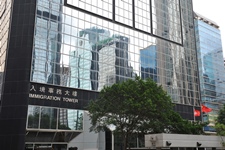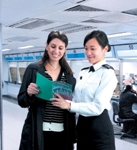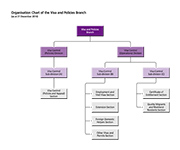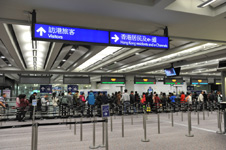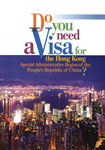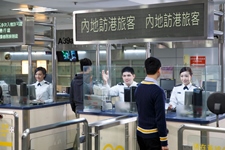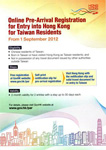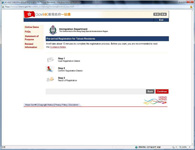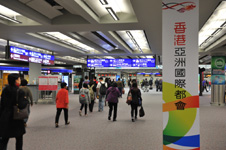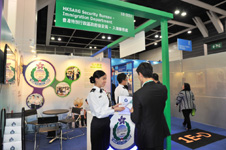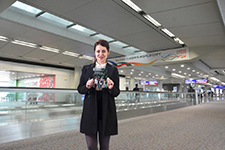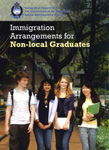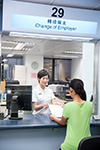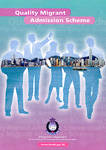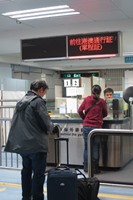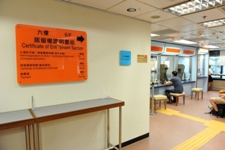Immigration Autonomy
The Hong Kong Special Administrative Region (HKSAR) is an inalienable part of the People's Republic of China but enjoys a high degree of autonomy over its affairs including immigration control. Article 154 of the Basic Law provides that the Government of the HKSAR may apply immigration controls on entry into, stay in and departure from the Region by persons from foreign states and regions. In other words, Hong Kong continues to operate its own immigration control after the Reunification, with autonomy over its immigration policy.
The Immigration Service in Hong Kong is committed to exercising effective immigration control and enforcing the laws, but equal emphasis is also placed on providing travel convenience and facilitation for tourists, business visitors and Hong Kong residents. The objectives of the Department's work on visa control are therefore:
- to guard against the entry of undesirable persons to maintain Hong Kong's prosperity and stability;
- to facilitate the entry of talent and professionals to enhance Hong Kong's competitiveness while protecting the local labour force from unfair competition; and
- to facilitate the mobility of tourists and business people, making Hong Kong an attractive tourist and business centre.
Visa and Entry Permit System
Persons who do not have the right of abode or right to land in Hong Kong require visas / entry permits before coming to Hong Kong for visit (except those who may come visa-free under the prevailing immigration policy), employment, investment, training, residence or study. Such pre-entry immigration examination system is effective in that it ensures only those who are qualified for entry under the prevailing immigration policy are admitted into Hong Kong. The system also ensures that undesirable persons are prevented from coming to Hong Kong.
To apply for visas / entry permits for Hong Kong, applicants may send their applications direct to the Department or through their sponsors in person or by post. The processing time for an application is normally four to six weeks.
Furthermore, visa / entry permit applications may be submitted to the Chinese diplomatic and consular missions nearest to the applicants' place of residence. It normally takes a few days for a mission to issue a visit visa / entry permit if the application does not require reference to the Hong Kong Immigration Department. If applications have to be referred to the Immigration Department, the processing time will take about four to six weeks.
Foreign nationals living in the Mainland may submit visa applications to the Immigration Division of the Office of the Government of the HKSAR in Beijing. Those in the Macao Special Administrative Region may apply to the Office of the Commissioner of the Ministry of Foreign Affairs of the People's Republic of China in the Macao Special Administrative Region.
Visa and Policies Branch
Commanded by an Assistant Director, the Visa and Policies Branch is responsible for the policy formulation and implementation regarding visas / entry permits and extensions of stay. The branch comprises two divisions, namely the Visa Control (Policies) Division and the Visa Control (Operations) Division. Each division is headed by a Principal Immigration Officer. The major areas of work of Visa and Policies Branch are:
- to formulate and review policy and assessment procedures on visa matters with a view to meeting the changing needs of Hong Kong, responding to the changes in external circumstances, facilitating visitors, and enhancing policy maintenance and operational efficiency and effectiveness of the visa and entry permit system;
- to process applications for entry into Hong Kong for visit, employment, investment, training, residence and study in accordance with the existing immigration policies and procedures;
- to process applications for extension of stay from visitors and temporary residents;
- to prevent the entry of undesirable persons who are likely to pose a threat to the security, prosperity and well-being of Hong Kong;
- to process applications for Certificate of Entitlement to the Right of Abode in the HKSAR from persons of Chinese nationality who claim to have the right of abode in Hong Kong by descent from their either parent; and
- to handle appeals / petitions / judicial reviews relating to Certificate of Entitlement and visa control matters.
Entry for Visit
The HKSAR Government has all along adopted an open immigration policy. Nationals of about 170 foreign countries and territories may come for business, social or pleasure visits visa-free for a stay ranging from 7 to 180 days.
Mainland Visitors
There are separate arrangements for the entry of Mainland visitors who may stay in Hong Kong for a period from 7 to 90 days. Those who wish to visit relatives or have sightseeing in Hong Kong should obtain an Exit-Entry Permit for Travelling to and from Hong Kong and Macao and an appropriate exit endorsement from the Mainland authorities.
Individual Visit Scheme for Mainland Residents
The Mainland 'Individual Visit Scheme' was implemented in July 2003. Currently, residents of all of the 21 cities in the Guangdong Province and 28 other cities, i.e. Beijing, Shanghai, Tianjin, Chongqing, Nanjing, Suzhou, Wuxi, Hangzhou, Ningbo, Taizhou, Fuzhou, Xiamen, Quanzhou, Chengdu, Jinan, Shenyang, Dalian, Nanchang, Changsha, Nanning, Haikou, Guiyang, Kunming, Shijiazhuang, Zhengzhou, Changchun, Hefei and Wuhan, are able to visit Hong Kong on an individual basis. Visitors from the Mainland under this Scheme are permitted to remain in Hong Kong for a period of not more than seven days upon each entry. The arrangement benefits local tourism, retail and other related industries.
Starting from 1 April 2009, Shenzhen residents may apply to the Exit and Entry Administration Office of the Public Security Bureau of Shenzhen for multiple-journey Individual Visit Endorsement for visiting Hong Kong, which is valid for one year. With effect from 15 December of the same year, the Mainland 'Individual Visit Scheme' has been extended to non-Guangdong residents in Shenzhen. Eligible applicants may apply to the Exit and Entry Administration Office of the Public Security Bureau of Shenzhen for Individual Visit endorsement which is valid for a single journey with three-month or one-year validity. Holders of Exit-Entry Permits for Travelling to and from Hong Kong and Macao bearing the endorsement may remain in Hong Kong for a period of not more than seven days.
With effect from 15 December 2010, the scope of non-Guangdong residents in Shenzhen who are eligible for Individual Visit Endorsement has been further extended to cover employees of municipal government, state-run and private enterprises, joint ventures, foreign enterprises and individual commercial businesses.
Business Visit Scheme
Since March 1998, Mainland business people who wish to come to Hong Kong for business visits may apply to the Mainland authorities for business visit endorsements on their Exit-Entry Permits for Travelling to and from Hong Kong and Macao. In 2014, an average of 3,558 Mainland business visitors entered Hong Kong each day under this Scheme.
Taiwan Visitors
Taiwan visitors may apply for Hong Kong Entry Permits through the authorised airlines in Taiwan. Permits are normally issued within two working days. Holders of Multiple Entry Permits may visit Hong Kong for a stay of 30 days on each landing.
Since 27 April 2009, Taiwan residents holding a valid Mainland Travel Permit for Taiwan Residents, commonly known as 'Tai Bao Zheng', may visit Hong Kong and stay for seven days without the need to possess a valid entry-exit endorsement for the Mainland. To further facilitate Taiwan residents to visit Hong Kong, with effect from 1 September 2011, the period of stay in Hong Kong for holders of Mainland Travel Permit for Taiwan Residents has been extended from 7 days to 30 days.
Since 1 September 2012, eligible Taiwan residents may submit pre-arrival registration on their own using the e-Service platform 'Pre-arrival Registration for Taiwan Residents (PAR)' at the GovHK website (www.gov.hk/par) free of charge. The computer system will process the registration and display the result instantly. Each PAR is valid for two months and good for two entries to Hong Kong as a visitor for up to 30 days on each landing. Up to 31 December 2014, there were 1,004,297 successful registrations. As the PAR is well received by Taiwan residents, the iPermit Scheme was terminated on 1 March 2014.
Asia-Pacific Economic Cooperation (APEC) Business Travel Card
The APEC Business Travel Card Trial Scheme was introduced on 29 May 1998. Well received by business travellers, the Scheme became a permanent one in March 1999. At present, 19 APEC economies participate in and fully operate the Scheme, namely Australia, Brunei Darussalam, Chile, the People's Republic of China, Hong Kong (China), Indonesia, Japan, the Republic of Korea, Malaysia, Mexico, New Zealand, Papua New Guinea, Peru, the Philippines, Russia, Singapore, Chinese Taipei, Thailand and Vietnam.
The APEC Business Travel Cards are valid for three years and enable the holders who have obtained pre-clearance from the participating economies to make multiple visits to these economies without visas for up to two to three months' stay on each occasion. In Hong Kong, the card holders may use designated counters at control points where available.
Starting from 1 June 2008, card holders may use the special service lanes at selected control points of participating economies regardless of whether pre-clearance has been granted by that economy. For card holders travelling to a participating economy where pre-clearance has not been granted, they are still subject to the normal immigration clearance process, such as presenting valid passports and, where appropriate, valid visas.
Special immigration lanes for card holders have been provided by the United States and Canada at their international airports since 19 November 2006 and 1 January 2008 respectively. Card holders are still required to meet the usual immigration requirements, such as presenting valid passports and visas for the United States and Canada, where applicable.
There has been an upsurge of APEC Business Travel Cards issued by Government of the HKSAR in recent years. Up to 31 December 2014, 44,329 APEC Business Travel Cards were issued and 290,650 requests for pre-clearance from other participating economies were processed in Hong Kong.
Working Holiday Scheme
The Working Holiday Scheme was introduced in April 2001. The purpose of the Scheme is to facilitate cultural and educational exchange and to strengthen bilateral relations between Hong Kong and the participating countries. Holders of national passports of the participating countries or HKSAR passport holders, who are aged between 18 and 30, ordinarily residing in their home place and whose main intention of entry is holiday-making are eligible to join the Scheme. Currently, the participating countries of the Scheme include Australia, Canada, France, Germany, Ireland, Japan, the Republic of Korea, New Zealand and the United Kingdom, to which the Scheme was extended with effect from 1 January 2014. Participants of the Scheme are allowed to stay up to 12 months in Hong Kong for holiday and to take up short-term employment during their stay. Those from Australia, Canada, France, Germany, Japan, the Republic of Korea, New Zealand and the United Kingdom may also enrol in a short educational or training course. Up to 31 December 2014, 4,623 applications were approved by the Department.
New Initiatives to Enhance Travel Convenience for Visitors
The Department has been keeping the visa control system and processing procedures under constant review. New measures will be implemented as and when necessary to enhance the travel convenience of tourists and business people.
At present, multiple-journey visit visas may be issued to visa-required nationals who have a genuine need to visit Hong Kong frequently and have made three or more trouble-free visits to Hong Kong in the 12 months preceding the application, or can satisfy the Director of Immigration that their visits may bring benefits to Hong Kong.
Entry for Employment
Professionals and Investors
Hong Kong is an international financial and business centre. Potential investors and persons who are in a position to make substantial contributions to the economy of Hong Kong will be admitted liberally. Employment visas are issued to persons who possess special skills, knowledge or experience of value to and not readily available in Hong Kong. In 2014, 31,676 professionals from all sectors and from more than 100 countries / territories were admitted into Hong Kong for employment, either on long-term basis or for short periods.
Admission Scheme for Mainland Talents and Professionals
The Admission Scheme for Mainland Talents and Professionals was implemented in July 2003. The objective of this Scheme is to attract qualified Mainland talent and professionals to work in Hong Kong in order to meet local manpower needs and enhance Hong Kong's competitiveness in the globalised market. This Scheme has no sectoral restrictions and allows intra-company transfer of senior managers and professionals. It also caters for the entry of talent and professionals in the arts, culture and sports sectors as well as those in the culinary profession so as to enhance Hong Kong's status as Asia's world city. As at 31 December 2014, 74,456 talent and professionals were admitted under the Scheme.
Mainland Professionals Residing Overseas
Since September 1990, a policy has been implemented whereby Mainland professionals residing overseas would be allowed to come to Hong Kong for employment provided that they apply from overseas and have been residing overseas for at least two years immediately before the submission of application. In the interest of Hong Kong's economic development, the overseas residential requirement for these Mainland professionals entering Hong Kong to take up employment has been relaxed to one year with effect from 1 November 2000. Between November 2000 and December 2014, 5,400 Mainland professionals residing overseas were admitted to work in Hong Kong.
Immigration Arrangements for Non-local Graduates
The Immigration Arrangements for Non-local Graduates (IANG) was introduced on 19 May 2008 to further attract non-local graduates to stay / return and work in Hong Kong, so as to strengthen Hong Kong's human resources and competitiveness and enhance Hong Kong's attractiveness to non-local students.
Non-local graduates refer to non-local students who have obtained a degree at undergraduate level or higher qualification in a full-time and locally-accredited local programme in Hong Kong. Those who apply to stay and work in Hong Kong within six months after the date of their graduation (i.e. the date shown on their graduation certificates) are classified as non-local fresh graduates. They are not required to secure an offer of employment upon application.
Returning non-local graduates are those who submit applications after six months of the date of their graduation. They are required to secure an offer of employment upon application. Their applications will be favourably considered so long as the job is at a level commonly taken up by degree holders and the remuneration package is set at market level.
Successful applicants under the IANG who are able to meet the normal immigration requirements may be granted 12 months' stay without other conditions of stay. They are free to take up and change employment during their permitted stay without the need to seek prior approval from the Department. They may apply to bring in their spouse and unmarried dependent children under the age of 18 to Hong Kong for residence under the prevailing dependant policy. The stay of the applicants will be extended if they are still employed under the conditions mentioned above. As at 31 December 2014, 41,194 non-local graduates were approved to work in Hong Kong under this arrangement.
Imported Workers
The Supplementary Labour Scheme was introduced in 1996 to relieve shortage of labour on a limited scale by filling vacancies which could not be filled by local workers. It is monitored by a Labour Advisory Board which comprises representatives from employers and labour unions. As at 31 December 2014, 26,549 workers had been admitted under the Scheme and 2,990 of them were still in Hong Kong. Imported workers are normally allowed to stay for an initial period of 12 months. They are required to return to their places of origin on completion of their employment contracts which are normally valid for a maximum period of two years.
Foreign Domestic Helpers
Foreign domestic helpers are allowed to work in Hong Kong to relieve many families of household chores. Their employment is on a two-year contract basis. The population of foreign domestic helpers as at 31 December 2014 was 330,650, about 52 per cent and 45 per cent of which were from the Philippines and Indonesia respectively.
Foreign domestic helpers are not allowed to work as full-time chauffeurs, and are prohibited from performing all sorts of driving duties with effect from 1 January 2000. Local employers who have a genuine need for their foreign domestic helpers to perform limited driving duties incidental to and arising from their domestic work have to apply to the Director of Immigration for special permission of such deployment.
Entry for Study
Foreign students are allowed to take up studies in private schools registered under the Education Ordinance and the Post Secondary Colleges Ordinance. With effect from 1999-2000 academic year, Mainland students may be allowed to pursue full-time undergraduate study programmes in Hong Kong.
The entry of non-local students for education was relaxed in the 2005-2006 academic year to enable the development of Hong Kong into the regional education hub. Under the relaxed policy, students from the Mainland, Macao and Taiwan are allowed to enter Hong Kong for enrolment in all full-time and locally accredited programmes at post-secondary (i.e. sub-degree and above) level. Students from Macao and Taiwan, like all other non-local students, are allowed to enter Hong Kong for exchange programmes at degree or above levels lasting for up to one year. Students from the Mainland are also allowed to enter Hong Kong for part-time studies in locally accredited taught post-graduate programmes run by the University Grants Committee-funded institutions whilst all other non-local students are allowed to study in any locally accredited part-time taught post-graduate programmes. Mainland students at secondary school level can come for short-term exchange programmes approved by the Education Bureau of not more than two weeks, if accompanied by Mainland teachers.
Starting from 19 May 2008, students from the Mainland, Macao and Taiwan may apply for entry to pursue short-term studies in programmes offered by Hong Kong higher education institutions with degree-awarding powers, provided that the cumulative duration of short-term studies should not exceed 180 days within any 12-month period. Concurrently, non-local full-time students of locally-accredited programmes at degree level or above, whose study period are not less than one academic year, may be allowed to take up study / curriculum-related internship arranged or endorsed by the institutions that they are studying in. These students (excluding exchange students) may also be allowed to take up part-time on-campus jobs for up to 20 hours per week throughout the year, and summer jobs during the period from 1 June to 31 August.
With effect from 17 March 2014, the existing entry arrangements for non-local students was further enhanced. Non-local students may apply to enter Hong Kong for exchange in full-time locally-accredited local programmes at sub-degree level and non-local programmes at undergraduate or above level. Besides, non-local students of full-time locally-accredited local programmes at sub-degree level and non-local programmes at undergraduate or above level may take up mandatory and study/curriculum-related internship and study/curriculum-related internship respectively. Non-local students admitted to take up studies in full-time locally-accredited local and non-local post-secondary programmes will be granted, upon entry, a length of stay in line with the normal duration of their study programmes, subject to a maximum period of six years.
With effect from 17 March 2014, nationals of Albania may apply for entry into Hong Kong for study and admission under IANG.
In 2014, 29,225 non-local students (including 19,606 Mainland students) were admitted to study in Hong Kong. Most of the non-local students were admitted to take up post-secondary courses.
Capital Investment Entrant Scheme
The Capital Investment Entrant Scheme (CIES) was launched in October 2003. The objective of the Scheme is to facilitate the entry for residence by capital investment entrants, i.e. persons who make capital investment of not less than $6.5 million in permissible investment assets in Hong Kong but would not be engaged in the running of any business here. The entrants are allowed to make their choice of investments amongst permissible investment assets.
To ensure that the Scheme is being kept up-to-date and continues to serve the best overall interests of Hong Kong, the Government reviewed the Scheme rules in 2010. After the review, with effect from 14 October 2010, amendments to the Scheme rules, including raising the threshold of capital investment from $6.5 million to $10 million, temporarily suspending real estate as a class of permissible investment assets under the Scheme, etc., were introduced.
As at 31 December 2014, 41,802 entrant applications, together with 73,321 related dependant applications, were received. Of which, 27,997 entrant applications were approved, including 25,504 for Formal Approval and 2,493 for Approval-in-Principle. The amount of investments made under the Scheme totalled $216.1 billion.
To shorten the processing time of the applications under the Scheme, with effect from 16 March 2009, applicants may decide on their own whether or not to hire a Certified Public Accountant (Practising) who is a member of the Hong Kong Institute of Certified Public Accountants to assist them in the preparation of financial reports. As at 31 December 2014, 22,740 applications were submitted with financial reports prepared by Certified Public Accountant (Practising), representing around 65 per cent of new applications received.
Quality Migrant Admission Scheme
The Quality Migrant Admission Scheme was implemented on 28 June 2006. The Scheme is quota-based and operated on a points-based system. It seeks to attract highly skilled or talented persons from the Mainland and overseas to settle in Hong Kong in order to enhance Hong Kong's economic competitiveness in the globalised market. Successful applicants are not required to secure an offer of local employment before taking up residence in Hong Kong. They may also apply to bring in their spouse and unmarried dependent children below the age of 18 under the prevailing dependant policy. All applicants are required to fulfill a set of prerequisites before they can be awarded points under one of the two points-based tests, namely the 'General Points Test' and the 'Achievement-based Points Test' , and compete for quota allocation with other applicants.
Successful applicants will normally be granted an initial stay of 12 months in Hong Kong. At the end of this period, entrants admitted under the Scheme should demonstrate that they have taken steps to settle in Hong Kong by taking up residence here, e.g. by securing a gainful employment or establishing a business, before extension of stay is granted. For persons admitted through the 'Achievement-based Points Test' under the Scheme, the Department may grant an extension to them and / or their dependants if the Department is satisfied that they have the financial means to sustain their living in Hong Kong.
As at 31 December 2014, 3,097 applicants were allocated with quotas under the Scheme.
Entry of Dependants
The immigration policy allows eligible persons to join their close relatives residing in Hong Kong as dependants. Depending on the immigration status of the sponsors, categories of eligible dependants include dependent spouse, unmarried dependent children under 18 years of age and dependent parents aged 60 or above. The sponsors of dependant visa applications include Hong Kong permanent residents, non-permanent Hong Kong residents who are admitted as entrants under the Capital Investment Entrant Scheme or the Quality Migrant Admission Scheme, for employment (except those admitted to work as foreign domestic helpers or imported workers under the importation of labour scheme) or as full-time students in tertiary educational institutions. Dependency is an essential element of the policy on entry of dependants. The sponsors must be able to support the dependants' living at a standard well above the subsistence level and provide them with suitable accommodation in Hong Kong. In 2014, 20,029 dependant visas were issued.
For Mainland residents who have been admitted into Hong Kong to work or take up full-time tertiary study under the various Schemes or arrangements catering for Mainland residents, their dependent spouses and unmarried dependent children under the age of 18 (be they Mainland residents or not) may apply for entry for residence in Hong Kong as dependants. In 2014, 2,670 dependant entry permits / visas under this category were issued.
Entry of One-way Permit Holders
The entry of Mainland residents into Hong Kong for residence is provided for under Article 22 of the Basic Law. It states that 'For entry into the HKSAR, people from other parts of China must apply for approval. Among them, the number of persons who enter the Region for the purpose of settlement shall be determined by the competent authorities of the Central People's Government after consulting the government of the Region'. Residents from the Mainland may come to Hong Kong for settlement through the One-way Permit Scheme. The Scheme, mainly to facilitate family reunion, effectively regulates the entry of Mainland residents into Hong Kong for settlement so that the prosperity and stability of Hong Kong are maintained.
One-way Permits are issued by the relevant authorities of the Public Security Bureau in the Mainland. The daily quota of One-way Permits is 150, including 60 reserved for persons who were born in the Mainland and have the right of abode in Hong Kong by descent from their either parent in accordance with Article 24(2)(3) of the Basic Law, and 30 reserved for long separated spouses. In 2014, 40,496 Mainland residents entered Hong Kong for settlement through the One-way Permit Scheme.
Certificate of Entitlement Scheme
To implement the Basic Law provisions on the right of abode, the Immigration Ordinance was amended to align with Article 24(2) of the Basic Law on 1 July 1997. On 9 July 1997, the Immigration Ordinance was further amended to introduce the Certificate of Entitlement Scheme, whereby persons claiming the right of abode in Hong Kong under Article 24(2)(3) of the Basic Law would need to have their claims verified by the relevant authorities and be issued with a Certificate of Entitlement, which would be affixed to their One-way Permits / valid travel document, before they could establish their status as permanent resident in Hong Kong. As at 31 December 2014, 215,586 persons entered Hong Kong under the Scheme.
Genetic Test
For some Certificate of Entitlement applications, the applicants and their claimed parents may need to undergo a genetic test when the claimed parent and child relationship cannot be established on the basis of the documentary proof submitted. The Immigration (Amendment) Ordinance 2001 in respect of the genetic test procedures came into operation on 26 July 2001. The genetic test arrangements and the relevant fee were also specified in the Gazette Notice. Up to 31 December 2014, 36,178 applications requiring genetic tests were received.
Appeals under Certificate of Entitlement Scheme
The legislative amendments to the Immigration Regulations enacted in January 2000 provide for the procedures to be followed in appeals to the Immigration Tribunal against the decision of the Director of Immigration not to issue Certificates of Entitlement or certified duplicates. As at 31 December 2014, 1,430 appeals were received from the Immigration Tribunal.
Appointment Booking Service for Extension of Stay Application
The Department has since 30 November 2009 extended its appointment booking service for extension of stay application at the Immigration Headquarters. Eligible non-permanent residents may book appointments through the Internet or the 24-hour Appointment Booking Hotline. Moreover, applicants who have submitted applications for visas / entry permits may enquire about the application status through the Internet or the 24-hour Telephone Enquiry System.
Online Submission of Application for Extension of Stay
The Department launched e-submission service for extension of stay application on 26 May 2010. Eligible non-permanent Hong Kong residents may submit their applications for extension of stay online through the Internet.

